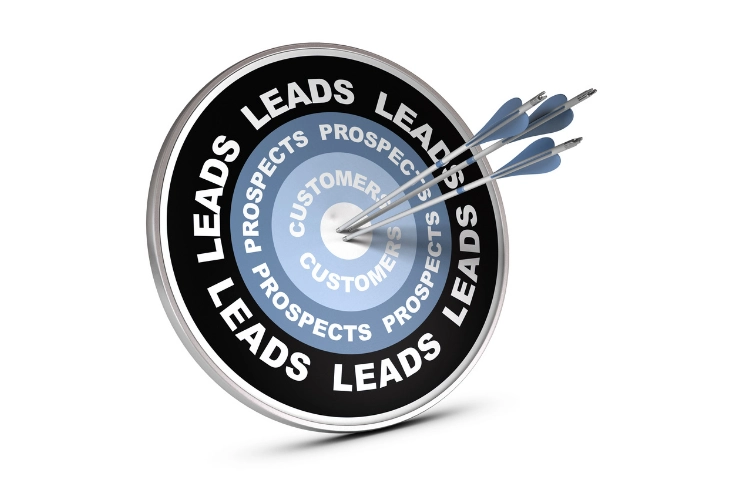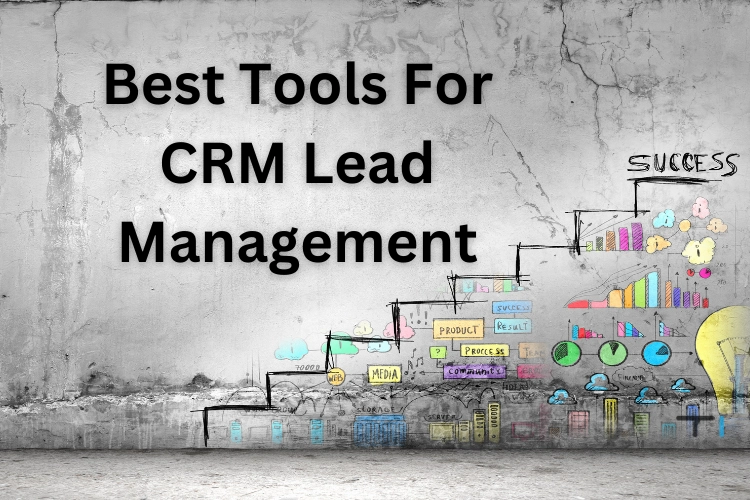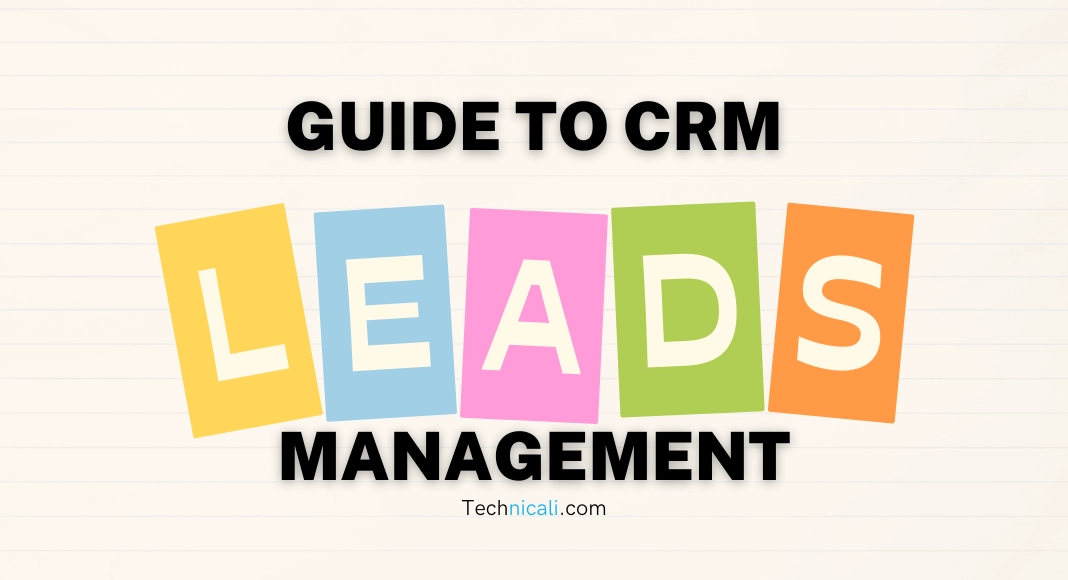In the realm of SaaS, particularly in Customer Relationship Management (CRM), lead management is a big deal. It’s not just about handling leads; it’s about getting them, nurturing them, and turning them into lifelong customers. This guide dives deep into the world of CRM lead management, helping you align your business strategies with the ever-changing needs of your market. So, let’s get started and make your lead management game strong!
Contents
- 1 Understanding CRM Leads
- 2 Importance of CRM Lead Management
- 3 The Need for CRM Lead Management
- 4 Benefits of CRM Lead Management
- 5 Step-by-Step Guide to CRM Lead Management
- 6 Best Tools for CRM Lead Management
- 7 Choosing the Right CRM Tool for Your Business
- 8 Future Scope of CRM Lead Management
- 9 Conclusion
- 10 FAQs
Understanding CRM Leads

Definition and Types of CRM Leads
CRM leads are the potential customers who have shown interest in your product or service. They are like the building blocks of your sales pipeline in a CRM system. We’ve got two types of these leads: Marketing Qualified Leads (MQL) and Sales Qualified Leads (SQL). Each type represents a different stage in the customer journey, from initial interest to being ready to purchase.
Marketing Qualified Leads (MQL)
Marketing Qualified Leads (MQLs) are those individuals who have engaged with a company’s marketing efforts, indicating initial interest or interaction. They’ve taken actions like visiting the website, downloading content, or even attending webinars. MQLs aren’t quite ready to purchase yet. They’ve just shown enough interest to qualify for extra love and nurturing from the marketing team to guide them along the buying journey. So, we’ll take it step by step, gradually moving them closer to that ultimate goal.
Sales Qualified Leads (SQL)
Sales Qualified Leads are the rock stars of the sales process. These leads have been thoroughly evaluated and analyzed by our sales team. They are ready to rock and roll with direct sales follow-up. These leads have shown us some serious interest and engagement – they’re not just window shopping. They’ve gone as far as requesting a product demo or filling out a contact form. These SQLs mean business and are actively considering making a purchase.
The CRM Lead Lifecycle
Understanding the CRM lead lifecycle is crucial. It’s like watching leads grow from clueless toddlers to loyal customers. Picture this: lead generation is like planting the seed, lead nurturing is like watering and taking care of the delicate sprout, and lead conversion is like witnessing the beautiful blossoming flower. It’s a journey worth taking to achieve business success!
Lead Generation
Lead generation is the process of finding potential leads or prospects. This is where the magic starts, as you attract people and gather their details. Think of it as building your own Avengers team of potential customers. You can unleash the power of content marketing, social media engagement, and online advertising to achieve this. It’s like casting a wide net to catch fish waiting to be reeled in. So, get ready to conquer the world of lead generation and build your league of extraordinary customers!
Lead Nurturing
Once leads are generated, they enter the lead nurturing stage. This is where the magic happens! We engage with those leads, providing them with all the juicy, relevant info and support they need. Our goal? Building a strong relationship and guiding them closer to that sweet purchase decision.
Lead nurturing is about delivering targeted content, personalized email campaigns, and regular follow-ups. We want to ensure these leads get the needed information based on their interests and behaviors. No generic stuff here, folks! It’s all about giving them exactly what they crave. So, let’s nurture these leads and turn them into loyal customers!
Lead Conversion
The last step in the CRM lead lifecycle is lead conversion. It’s the moment of truth when those nurtured leads become paying customers. This is where we put our lead nurturing efforts to the test. Our sales team takes center stage with personalized presentations, product demos, and tailored solutions to address the lead’s unique needs and challenges. The key to successful conversion lies in truly understanding what the lead wants and offering a value proposition that blows their socks off. It’s like knowing their favorite ice cream flavor before they’ve even said a word. So, let’s crack the code and turn those leads into loyal customers!
Importance of CRM Lead Management

Aligning Sales and Marketing Efforts
CRM lead management is a secret weapon that brings sales and marketing teams together. It’s all about working towards common goals and ensuring leads aren’t lost in the shuffle. With CRM, marketing efforts smoothly transition to the sales team for conversion, maximizing the potential of both. It’s like having your little rebellion against traditional business practices. So, why settle for the same old boring routine when you can shake things up and make magic happen? Embrace the power of CRM and watch your sales and marketing efforts reach new heights!
Enhancing Customer Understanding and Relationships
Effective CRM lead management plays a freakin’ crucial role in developing a deeper understanding of customers. Businesses can tailor their approaches to meet individual customer needs by collecting and analyzing data on customer interactions and preferences. This personalized attention strengthens customer relationships because, let’s be real, clients feel valued and understood. Enhanced customer relationships are important for customer retention and loyalty, ultimately contributing to long-term business success. No doubt about it!
Streamlining the Sales Process
CRM lead management is like the superhero of the sales process. It swoops in and saves the day by organizing lead information and automating sales steps. Say goodbye to manual effort and hello to a faster sales process! Sales reps have all the info they need at their fingertips, making them decision-making champions. This efficiency speeds up the sales cycle and increases the chances of successful conversions, boosting sales productivity.
DataDriven Decision Making
CRM lead management is all about getting the inside scoop on your customers and using that knowledge to make smarter decisions. With fancy analytics and reporting features, CRM systems give you the lowdown on customer behavior, sales trends, and lead conversion rates. It’s like having a crystal ball that tells you exactly what to do next. With this data-driven approach, you can fine-tune your marketing and sales efforts, adjust, and leave your competition in the dust. So, who needs luck when you’ve got CRM lead management on your side?
The Need for CRM Lead Management

Challenges in Lead Management Without CRM
1. Disorganized Lead Data: How do you manage and access lead data without a CRM system? You’ll be losing, overlooking, and poorly managing leads left and right. Trust me, it’s a recipe for missed opportunities and decreased sales efficiency. Don’t let that happen! Get yourself a structured system to organize and track information. It’s the key to success!
2. Poor Lead Prioritization: Businesses can struggle to determine which leads to focus without CRM. It’s like finding a needle in a haystack without knowing where to start. Sales teams waste time on low-priority leads while the big opportunities slip away. You need a clear understanding of each lead’s potential and where they are in the buying process. Otherwise, it’s like playing a game of chance and hoping for the best. Don’t leave it to luck, my friend. Get yourself a CRM and start prioritizing like a pro.
3. Inefficient FollowUp and Customer Engagement: Tracking and managing follow-ups with potential leads can be a real nightmare without a CRM system. Seriously, it’s like trying to juggle flaming swords blindfolded! You’ll miss important communication or fail to engage with leads at crucial moments. You don’t want to lose out on sales opportunities or ruin your chances of building strong customer relationships, do you? Without CRM, businesses struggle to maintain consistent and timely interactions with their leads. So, if you’re serious about converting leads into customers, get yourself a good CRM system.
4. Lack of Insight into Lead Sources and Marketing ROI: Managing leads without a CRM system is difficult without knowing where you’re going. You’re left clueless about which lead sources and marketing efforts are working. It’s like throwing spaghetti at the wall and hoping something sticks. Without a CRM, you’re flying blind and missing out on valuable insights to optimize your marketing campaigns. It’s time to step into the light and embrace the power of CRM!
How CRM Addresses These Challenges
1. Streamlined FollowUp and Enhanced Customer Engagement: CRM systems follow-up processes and customer engagement strategies. They swoop in and save the day by automating and organizing communication schedules, ensuring no lead gets left behind. With reminders and interaction tracking, CRM enables businesses to strike when the iron is hot, increasing the chances of turning leads into loyal customers. This systematic approach streamlines follow-up efforts, guaranteeing consistent and meaningful engagement with potential customers.
2. Comprehensive Insights into Lead Sources and Marketing ROI: CRM tools give you the inside scoop on where your leads come from and which marketing channels work. With all those fancy analytics and reports, you can easily figure out what’s bringing in the big bucks and tweak your strategies accordingly. It tells you where to invest your marketing resources for the best return. These CRM systems are like the marketing whisperers, helping you spot the golden campaigns and replicate their success. Trust me, they know their stuff when it comes to marketing performance.
3. Centralization and Organization of Lead Data: CRM systems, oh boy, they’re like the superheroes of lead management. They swoop in and save the day by centralizing all that lead-related info; no more chaos of scattered data across different platforms or spreadsheets. With everything in one place, businesses can easily access and analyze lead data, grasp customer needs, and tailor those sales strategies. It’s all about keeping that sales process efficient and ensuring everyone’s on the same page with the latest info.
4. Effective Lead Prioritization and Management: CRMs are like those super organized people who have everything sorted and labeled in their lives. They know how to segment and score leads based on all these predefined criteria. It’s like they have a secret code or something! And you know what? This helps in prioritizing leads effectively. They ensure sales efforts focus on the most promising leads, increasing the chances of successful conversions. These CRM tools even let sales teams categorize leads based on where they are in the sales funnel, their level of engagement, and how much they’re worth to the company. It’s like having a little army of sales geniuses working for you! This strategic approach to lead management makes sales efforts super efficient and effective. So, if you want to up your sales game, CRMs are the way to go!
5. Enhanced Collaboration Across Teams: CRM systems are superheroes for your business. They bring together sales, marketing, and customer service data, making collaboration between departments. No more playing the telephone game with leads – everyone’s on the same page, armed with the latest info. This means a more coordinated approach to lead management, a unified customer experience, and endless opportunities for cross-selling and upselling. It’s like having a secret weapon in your business arsenal! Who needs traditional when you can be extraordinary?
CRM systems tackle these challenges head-on by offering a comprehensive, organized, and efficient framework for lead management. Because who has time for disorganized processes? Not you, my friend! Why settle for chaos when you can optimize your sales processes and expand your customer base? CRM systems are the secret sauce to your success.
Benefits of CRM Lead Management

Improved Lead Quality and Conversion Rates
CRM lead management helps improve the quality of leads and boost conversion rates. With fancy analytics and lead scoring mechanisms, CRM systems can pinpoint the most promising leads so you can focus your sales efforts on the big fish. By pampering these high-quality leads through CRM processes, you’ll sail smoothly through the sales cycle, skyrocketing your conversion rates. Now, that’s what I call a recipe for success!
Enhanced Customer Engagement and Experience
CRM systems are like customer engagement and experience superheroes. Picture this: armed with detailed customer data and insights, they swoop in, ready to create personalized interactions that’ll blow your mind. It’s all about forging deep connections with potential and existing customers, making every interaction seriously relevant and meaningful. With CRM tools, you understand your customers’ preferences, behaviors, and feedback to tailor your communications and offers like a pro. Trust me, this enhanced engagement is the secret sauce for a mind-blowingly satisfying customer experience that breeds loyalty and long-term relationships. CRM for the win, people!
Increased Sales Efficiency and Productivity
CRM lead management swoops in to save the day, boosting efficiency and productivity. With CRM systems in place, say goodbye to manual effort and administrative tasks that drain your time. It streamlines the entire lead management process, from capturing leads to nurturing them until conversion. And guess what? This superpower allows sales representatives to focus on what they do best – engaging with leads and closing those deals. With repetitive tasks automated and essential information at their fingertips, sales teams become unstoppable. So, let CRM lead management be your sidekick and watch your productivity soar to new heights!
Better Forecasting and Reporting
CRM tools are priceless when it comes to providing insightful analytics. They are important for accurate sales forecasting and reporting. These bad boys collect and analyze many data points, giving you the lowdown on sales activities, customer interactions, and market trends. Let’s not forget about the reporting capabilities. With these, you can easily track key performance indicators (KPIs) and measure sales success. It’s like having your assistant doing all the heavy lifting for you. Talk about strategic decision-making and business planning made easy, am I right?
Step-by-Step Guide to CRM Lead Management

The following steps should be followed to ensure efficient lead management in CRMs –
Step 1: Lead Generation
- Identify Target Audience: First, you have to nail down your ideal customers. I’m talking demographics, interests, and their pesky pain points. This step is crucial for tailoring your marketing efforts. Now, let’s go out there and rock those tailored marketing campaigns!
- Choose Channels: Depending on your audience, you gotta choose the right channels to reach them. I’m talking digital channels like social media, SEO, and PPC campaigns, or if you’re into old-school stuff, you can try networking events and print advertising.
- Create Engaging Content: Create content that speaks directly to your target audience. Think blog posts, videos, infographics, or even webinars if you’re feeling fancy. The idea is to whip up value-packed content that gets potential customers all excited and willing to share their contact info.
Step 2: Lead Capture
- Implement Capture Tools: Use cool tools like online forms, landing pages, and lead magnets to collect juicy information from your leads. And make sure these tools are hooked up to your website and marketing channels because you don’t want to miss out on anything. So go ahead and embrace the awesomeness of these tools, and watch those leads roll in!
- Ensure Compliance: When it comes to your lead capture processes, you gotta play by the rules, man. Do you know those data protection and privacy laws like GDPR and CCPA? Yeah, you gotta comply with those bad boys. It means you gotta get explicit consent from individuals to collect and use their data.
Step 3: Lead Tracking
- Integrate Tracking Systems: To effectively track lead sources and activities, it’s wise to implement CRM systems or marketing automation tools. These tools let you know which web pages they visit or which emails they open. Because apparently, we need to have eyes everywhere! It’s all in the name of business success, right? So embrace the power of tracking because knowing is half the battle!
- Monitor Lead Activities: Monitor how leads engage with your content. It’s like being a detective, decoding their behavior and preferences to supercharge your marketing efforts. Because, let’s face it, you don’t want to be stuck in the same old marketing rush. Embrace the power of monitoring and unleash your marketing genius!
Step 4: Lead Qualification
- Set Criteria: Let’s establish some specific criteria to evaluate how likely a lead is to make a purchase. We’re talking budget, decision-making authority, specific needs, and their purchase timeline. You know, all the good stuff to separate the serious buyers from the window shoppers. Because let’s face it, we don’t have time for tire-kickers and time-wasters. We’re here to close deals and make things happen! So, let’s get down to business and find those high-quality leads ready to whip out their wallets and seal the deal.
- Score Leads: You gotta use a fancy lead-scoring system. Give those leads some points based on their actions and engagement level. This way, you can prioritize them for your sales team. Trust me, it’s gonna make your life easier. Now, go out there and conquer those leads!
Step 5: Lead Distribution
- Assign Leads: It’s time to distribute those leads among your sales team. But we’re not going to do it the old-fashioned way. Oh no, we’re going to shake things up! We will assign leads based on expertise, geographic territory, or the lead’s score and potential value. No more random allocations or playing favorites. It’s all about efficiency and maximizing those sales! So, let’s get cracking and make sure each team member gets the perfect lead for them.
- Automate Distribution: Use your CRM system to automatically assign leads to sales reps based on predefined rules – no more manual distribution – just quick and efficient lead allocation.
Step 6: Lead Nurturing
- Develop Nurturing Campaigns: Craft email campaigns, educational content, and other communication strategies to keep those leads hooked and moving through the sales funnel. Because let’s face it, we’re not here to play it safe and blend in with the crowd. We’re here to shake things up and leave a lasting impression. So, let’s get creative and show them what we’re made of!
- Engage Regularly: Stay in regular contact with leads, providing valuable information and solutions, and keep your brand at the forefront of their minds. Because, let’s face it, you want to be the cool kid on the block that everyone thinks of when they need something. So, don’t just sit twiddling your thumbs; get out there and make sure your leads know you’re the one they should be turning to.
Step 7: Lead Conversion
- Sales Follow-up: Once you’ve got a lead and are ready to go, it’s time to kick things up with direct sales interactions. You want to dive deep into their needs and show them how your solutions can make their dreams come true. So get out there and make some magic happen!
- Present Solutions: Why not add a personal touch when presenting your product or service? Tailor your presentations to address each potential customer’s unique needs and concerns.
- Close the Deal: Use effective closing techniques that practically beg the lead to make a purchase decision.
Step 8: Analysis and Optimization
- Track Conversion Rates: Don’t forget to monitor the percentage of leads that turn into customers. Look out for any trends or patterns while you’re at it. You never know what juicy insights you might find!
- Gather Feedback: Gather feedback from successful conversions and leads that didn’t convert to understand what worked and what didn’t. It’s like learning from the masters and the misses because, let’s face it, we can all use a little help in the conversion game.
- Refine Strategies: So here’s the deal: you gotta constantly tweak and improve your lead management strategies based on the insights and data you gather from your analysis.
Step 9: Post-Conversion Engagement
- Maintain Relationships: To keep your customers engaged, stay in touch with them on the reg. Newsletters, updates, and top-notch customer support are the way to go.
- Encourage Referrals: What’s a great way to get more customers? Ask your satisfied customers to refer your business to others. And hey, you can sweeten the deal by offering some incentives. Who doesn’t love a little extra motivation, right? So go ahead, spread the word, and watch your business grow!
- Upsell and Cross-sell: So, here’s the deal: if you want to boost your business, you gotta find those sweet opportunities to offer extra products or services to your existing customers. Trust me, it’ll enhance their value to your business.
This approach ensures the correct handling of leads from generation to conversion, laying a solid foundation for ongoing customer relationships and epic business growth. Because, let’s face it, who wants to be stuck in the same old boring business practices when you can shake things up and stand out from the crowd? So, buckle up and get ready to unleash the power of this comprehensive approach.
Best Tools for CRM Lead Management

Overview of Top CRM Lead Management Tools
My friend, the CRM lead management tools world is a wild ride. Each tool brings its unique set of features and benefits to the table, catering to the diverse needs of businesses. Now, let’s take a quick look at three standout tools, each with its personality and perfect match for different business sizes and requirements.
Salesforce Sales Cloud
Salesforce Sales Cloud is like the superhero of CRM for big businesses and enterprises. It has all the fancy automation powers you could ever want and plays nicely with many other apps. It’s got some serious brainpower when it comes to analytics. And the best part? It grows with your business, so you’ll never outgrow it. So, if you’re ready to take your business to the next level get ready for a wild ride with Salesforce Sales Cloud!
HubSpot CRM
HubSpot CRM is the perfect fit for midsized businesses. It’s got this super user-friendly interface that’s just a breeze to navigate. And the best part? You can customize it to match your unique processes. HubSpot CRM seamlessly integrates with their marketing platform. So, you can smoothly transition from marketing to sales without missing a beat. It’s like the ultimate tag team, working together to align your sales and marketing efforts. Boom! So, if you’re a midsized business looking for a CRM that’s easy to use, flexible, and plays nice with your marketing, look no further. HubSpot CRM has got your back. It’s the perfect wingman for your business success.
Zoho CRM
Zoho CRM is a fantastic choice for small businesses and startups. It focuses on core CRM functionalities, like lead and contact management, sales pipeline management, and basic automation features. It’s a budget-friendly option that doesn’t compromise on the essential CRM features. So, even working with limited resources, you can still have all the perks! Zoho CRM keeps it simple, making it super accessible for small businesses. There is no need to break the bank or stress about complicated systems. Zoho CRM has your back! For top CRM tools, check our blog post.
Choosing the Right CRM Tool for Your Business

Selecting the right CRM tool is a crucial decision and depends on several factors:
- Business Size and Complexity: When it comes to larger enterprises, they might need to go all out with a powerhouse solution like Salesforce. Small businesses can keep it simple and sweet with tools like Zoho CRM. There is no need to overcomplicate things.
- Specific Needs and Goals: When it comes to your business, you’ve got to think about what sets you apart. How integrated do you need to be? Do you care about lead scoring? And let’s not forget about aligning sales and marketing. These are the things that matter. So, don’t just copy what everyone else is doing. Be unique and make your mark.
- Budget Constraints: Assessing the total cost of ownership, including subscription fees, implementation costs, and any additional expenses for customization or extra features, is crucial. It’s like getting the full picture of what you’re getting into, so there are no surprises down the road.
- UserFriendliness and Training Requirements: Consider the learning curve for each tool and the availability of training and support. Let’s not forget to add a dash of humor and sarcasm to keep things interesting. Who wants to deal with a tool that’s as user-friendly as a Rubik’s Cube? And let’s not even get started on the training and support that’s as elusive as a unicorn in the bung-hole-of-the-universe Ohio. So, choose wisely and ensure you don’t end up with a tool that leaves you scratching your head and searching for help.
- Scalability and Flexibility: Make sure that the CRM tool can scale with your business and adapt to changing business needs. No one wants to be stuck with a tool that can’t keep up with your skyrocketing success, right? So, choose wisely and make sure your CRM can handle whatever comes your way!
Regarding CRM tools, you want one that fits your biz like a glove. It should help manage lead, fuel growth, and make your sales ops well-oiled. So, choose wisely, my friend! Your business success depends on it.
Future Scope of CRM Lead Management

Thanks to emerging technological trends and evolving business practices, CRM and lead management are getting a real makeover. It’s time to shake things up, people! Integrating advanced technologies and strategic approaches will redefine how businesses handle customer relationships and leads as we charge ahead.
AI and Machine Learning
Integrating AI and machine learning into CRM systems makes them smart tools to analyze heaps of data, spot patterns, and predict customer needs. It’s like having a crystal ball for lead scoring and personalizing interactions. They keep getting smarter with machine learning, constantly improving their predictions based on fresh data. It’s a game-changer for lead management strategies, leaving traditional approaches in the dust. Say goodbye to old-school practices and hello to the future of CRM!
Integration with Other Technologies
The future of CRM is all about its ability to seamlessly integrate with various other business technologies. We’re discussing marketing automation tools, customer service software, advanced analytics platforms, and ERP systems. These integrations give you a complete view of your customers, streamline processes, and ensure accurate data. It’s like having the secret sauce for a unified customer experience and data-driven business strategies.
The Evolving Role of CRM in Business Growth
CRM is like that friend who always has your back and helps you grow your business. It’s not just about managing customer relationships; it’s about having this secret weapon that gives you strategic insights to make smarter decisions. CRM systems will be even more powerful in the future, helping you spot market trends, understand customer behavior, and find new growth opportunities.
Predictions for Future CRM Developments
This future will have some seriously fancy tools and functionalities. Picture this: advanced analytics capabilities that dig deep into customer behavior and preferences. Yeah, we’re talking about some serious mind-reading stuff here. And that’s not all! CRM systems are gonna be all about personalized customer experiences. They will use data-driven magic to tailor interactions to customers’ needs and preferences. It’s like having your assistant, but way cooler. These fancy developments won’t just make lead management more efficient; they’ll take customer engagement and satisfaction to a new level.
Conclusion
The role of CRM in business growth is seriously no joke. It’s become a game-changer for gaining insights, driving sales, and building long-term customer relationships. And hold on tight because the future is bringing us even more advanced analytics, personalized experiences, and seamless operational integration. CRM lead management is about to become the MVP of business success! These CRM technologies and strategies aren’t just fancy upgrades; they’re shaping the future of how businesses connect with customers in our digital world. It’s a wild journey of constant innovation and adaptation, reflecting the ever-changing nature of business and technology.
FAQs

1. How does CRM Lead Management improve sales and marketing alignment?
Both teams must be on the same page and working with the same data and insights. You know, fostering collaboration and ensuring those leads smoothly transition from marketing to sales.
2. Can CRM Lead Management improve customer relationships?
Yeah, here’s the deal: by giving you some deep insights into customer behaviors and preferences, we can help you have those super personalized and effective interactions.
3. What are the key features to look for in a CRM Lead Management tool?
So, here’s the scoop on these key features: lead tracking, segmentation, scoring, nurturing tools, analytics, integration capabilities, and user-friendly interfaces. Pretty cool, right? These will make your life much easier and your business more successful.
4. How do AI and machine learning enhance CRM Lead Management?
These fancy-schmancy technologies work their magic, making CRM tools smarter than ever. Lead scoring? Predictive analytics? Automated personalization? You got it! These bad boys bring efficiency to a whole new level.
5. Is CRM Lead Management suitable for small businesses?
Sure thing! There are some seriously budget-friendly CRM options out there that cater to the fundamental needs of small businesses. Like seriously, they make it so accessible that even companies of all sizes can jump on board.
6. How do CRM systems help in lead prioritization?
They use these fancy lead-scoring mechanisms to evaluate and rank leads based on how likely they are to convert. This helps sales teams focus on the most promising prospects that are worth their time. No more wasting energy on dead-end leads!


